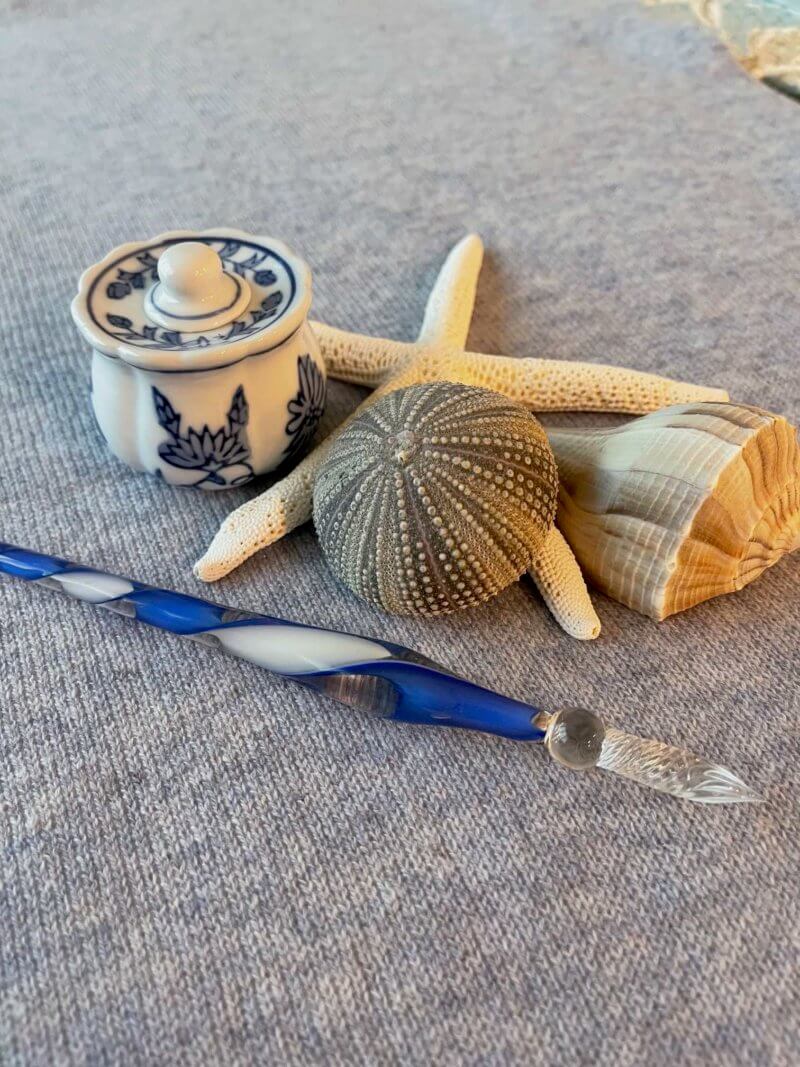Terry Helwig recently came out with a book named Shifting Shorelines: Messages from a Wiser Self. It piqued my interest. I can see myself reading this book down the line. In my time journalling, I often end up reflecting on the past and thinking about how I am wiser now. I was curious to learn from Terry about the writing process as well as what led her to pursue the idea of messages from a wiser self and the metaphor of the shorelines. She answered my questions in a beautiful guest post below. I hope you will enjoy it as much as I did! But first, let me introduce you to Terry.

Terry Helwig is an award-winning author whose new book, Shifting Shorelines, has been praised as a twenty-first century Gift from the Sea. Terry’s wise, lyrical, and heartwarming prose reveals a deep thinker who finds meaning and correlation between both her inner and outer worlds. A naturalist at heart, with a master’s degree in counseling psychology, Terry says nature and synchronicity have been two of her most profound teachers.
Her favorite pastime, combing the beach of a Florida barrier island, is a dream come true—especially for a child whose turbulent upbringing threatened to overwhelm her. Terry recounts her early struggle to keep hope alive in her coming-of-age memoir Moonlight on Linoleum, which won Elle Magazine’s 2012 Grand Prix Nonfiction Book of the Year.
Two of the brightest lights in Terry’s sky are her husband Jim and her daughter Mandy.

Exploring the Shoreline of Writing
By Terry Helwig
My writing process often mirrors my walks along the shoreline of the barrier island where I live. The sea graces the shoreline with mystery and bounty, much the same way inspiration seems to flow onto the written page. I collect scraps of paper, scribbled with ideas, with the same enthusiasm I gather up seashells. Many of those scraps of paper found their way into my book Shifting Shorelines: Messages from a Wiser Self, which is an ode to nature, the passage of time, and the ripening of wisdom.
I love exploring the shoreline between the seen and unseen, between the “sea” and “un-sea,” which is why I’m drawn to beach combing, in both real life and my writing life. Discovering just the right word or metaphor fills me with as much excitement as finding a perfectly formed lightening whelk churning in the surf. The rush of adrenaline or the “aha” when I find my way into a story, keeps me eagerly scanning the shoreline to see what else might be revealed.
Ideas
Where do ideas originate? Mine seem to spring forth from the depths of the unconscious, especially when I allow my mind to roam and wander. Ideas often appear, unbidden, right in front of me. But, occasionally, I have to poke around, raking through the flotsam at the tideline of my mind, looking for something—exactly what, I’m not quite sure.
The idea for Shifting Shorelines presented itself during one of my long, morning walks. It struck me that I had been walking the same shoreline for forty years; often with my head bent in consternation as I tried to remedy some concern or other. I suspected my angst dimmed not only my appreciation of the sea stretching far into the horizon, but also my appreciation of life. If only I could give my younger self a message. I pictured her, standing as still as an egret, looking out to sea. I longed to wrap my arms about her, draw her near, and whisper, “Listen, I have something to tell you.”
At that moment, goose bumps ran up and down my arms. The idea of talking to my younger self captured my imagination. I returned from my walk, sat down at my desk, and wrote what would become the introduction to my book.
I drink in the sight of her and her youth, knowing only too well the expression she wears on her face… I know the earnestness of her heart and the weight of her unnecessary angst as she beseeches the Universe for guidance.
I long to speak with her—tell her what I know and what I have learned. I have weathered the tides she is about to encounter and walked the shoreline ahead of her. I have seen the world, not only through her eyes, but also through the lens of time.
Afterward, I ferreted out a picture of my younger self and kept it nearby. Whenever I finished a chapter, I closed with an italicized message to my younger self that began: Listen…
Metaphor
Anyone who reads my writing knows that I love metaphor. Metaphor has the power to concretize an abstract idea. Metaphor speaks symbolically to more than just the conscious mind; it creates a participation mystique between writer and reader. A transmission of immediacy, clarity, and understanding takes place.
In addition to using metaphor in most of my stories, the entire concept of Shifting Shorelines is a metaphor. The term shifting shorelines is both literal and symbolic. I am naturalist at heart, so I talk about the actual changes to the shoreline of my barrier island and the treasury this natural habitat has to offer. But I also majored in psychology, and, symbolically and metaphorically, I see how the shoreline of our life is impacted and changed over the course of a lifetime.
Life ebbs and flows like the tides. Every tide carries some part of us away but returns unimagined gifts. Out goes folly, in comes wisdom. Out goes anguish, in comes grace. Out goes indifference, in comes compassion. These tides, like the tides of the sea, shift the shoreline of who we are and, more importantly, who we will become.
Structure
Structure holds ideas together in an orderly manner. Structure turns a heap of sand into a castle. It’s the skeleton beneath the words. I structured Shifting Shorelines into three sections that mirror the tides. The stories fit accordingly under each tide.
- Ebb tide can strand sea life when the water recedes farthest from the shore. In the psyche, ebb tide lays bare a wide swath of grief that sometimes strands hope and healing.
- Slack tide, the second section, depicts a time of calm when the water rests motionless. In the psyche, slack tides are the soft sighs of respite, a time to take stock and reflect.
- During flood tide, the water rises towards the dunes, smoothing gouged-out places and wiping the sand clean. In the psyche, flood tides are small epiphanies, treasured moments of well-being that swell the heart with love and gratitude.
Combing the shoreline of writing helps keep a sense of wonder and expectancy as I write. It’s as if I’m taking a stroll, collecting ideas, looking for metaphors, and trying to build a sand castle or two.
If only you could meet your younger greener self along life’s shore, what might you say?
Every time I read this post, it brings me a sense of peace. There is something about having lived and made it through the times that felt impossible. If I could meet my younger greener self, I would have so much to say to her! Maybe we will have a conversation about how we remember certain memories. I am sure that time has mellowed some and sharpened others for me. I would also like to tell her about our dreams and how her hopes worked out.
What are your thoughts on meeting your younger self? Tell us your answers in the comments! You can connect with Terry on Instagram and Facebook and read more about her writing on her website. Hear from other creators and read their journeys in The Creators’ Roulette archive.

Be First to Comment